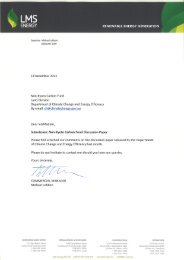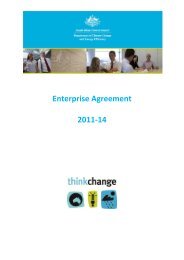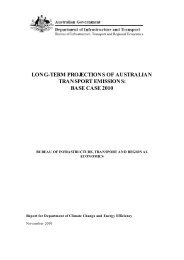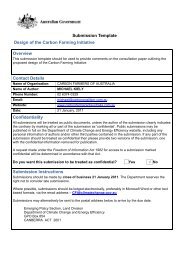Implications of Climate Change for Australia's World Heritage ...
Implications of Climate Change for Australia's World Heritage ...
Implications of Climate Change for Australia's World Heritage ...
You also want an ePaper? Increase the reach of your titles
YUMPU automatically turns print PDFs into web optimized ePapers that Google loves.
IMPLICATIONS OF CLIMATE CHANGE FOR AUSTRALIA’S WORLD HERITAGE PROPERTIES: A PRELIMINARY ASSESSMENT<br />
<strong>World</strong> <strong>Heritage</strong><br />
property<br />
Wet Tropics <strong>of</strong><br />
Queensland<br />
Shark Bay,<br />
Western Australia<br />
Potential climate threats Potential impacts Management/contingency<br />
plans/knowledge gaps<br />
• More intense cyclone and<br />
storm activity<br />
• Rising sea level<br />
• A rise in the orographic<br />
cloud layer<br />
• <strong>Change</strong>d fire regimes<br />
• Higher temperatures<br />
• More frequent drought<br />
• Increased evaporation<br />
• Increased carbon dioxide<br />
(CO 2 ) concentrations<br />
• Higher sea water<br />
temperatures<br />
• Sea level rise<br />
• Increased carbon dioxide<br />
(CO 2 ) concentrations<br />
• More frequent severe<br />
droughts, which affect<br />
conditions on land<br />
• Ocean acidification<br />
• More intense storms and<br />
cyclone activity<br />
• Reduction in occult<br />
precipitation may lead to<br />
significant hydrological<br />
changes<br />
• Reduction in streamflow<br />
• Rain<strong>for</strong>ests above 800 m,<br />
which contain the vast<br />
majority <strong>of</strong> the region’s<br />
endemic fauna, are at<br />
greatest risk from global<br />
warming<br />
• More vegetation damage<br />
from high, destructive winds<br />
• Alteration <strong>of</strong> seagrass<br />
habitats (changed salinity<br />
and more frequent storms)<br />
• The impact <strong>of</strong> raised<br />
temperatures and increased<br />
CO 2 is uncertain; higher<br />
levels may increase primary<br />
production <strong>of</strong> biomass<br />
• <strong>Change</strong>d relationships<br />
between sharks and<br />
other marine species as<br />
a result <strong>of</strong> changes to the<br />
Leeuwin Current<br />
• Attributes such as raised<br />
temperatures, storms<br />
and increased CO 2 levels<br />
will affect particular<br />
habitats (such as those<br />
occupied by reptiles and<br />
terrestrial mammals)<br />
• Increased sea temperatures<br />
may favour a southern<br />
movement <strong>of</strong> tropical<br />
marine life<br />
• Increased temperatures<br />
would appear likely to<br />
increase the frequency and<br />
effectiveness <strong>of</strong> predation by<br />
the tiger shark<br />
Options <strong>for</strong> translocation and<br />
restoration <strong>of</strong> species habitats,<br />
particularly in higher altitudes.<br />
Better water management<br />
strategies need to be<br />
developed, especially if annual<br />
rainfall is to decline as climate<br />
projections suggest. The<br />
downstream impacts from<br />
changes in the orographic<br />
cloud layer should be examined<br />
and modelled.<br />
There are uncertainties about<br />
the effect <strong>of</strong> climate change on<br />
currents along the continental<br />
shelf and fish stocks, in<br />
particular the Leeuwin Current.<br />
There is significant access to<br />
and commercial use <strong>of</strong> Shark<br />
Bay and its environs (including<br />
minerals extraction; prawn<br />
fishing; and ecotourism centred<br />
on migratory whales, turtles and<br />
dugong). Pressure from those<br />
activities is likely to increase<br />
with, <strong>for</strong> example, ecotourism<br />
becoming more intensive if<br />
climate change trends increase<br />
and if consumers believe<br />
that their window to ‘see the<br />
dugong be<strong>for</strong>e they disappear<br />
<strong>for</strong>ever’ is closing.<br />
15






